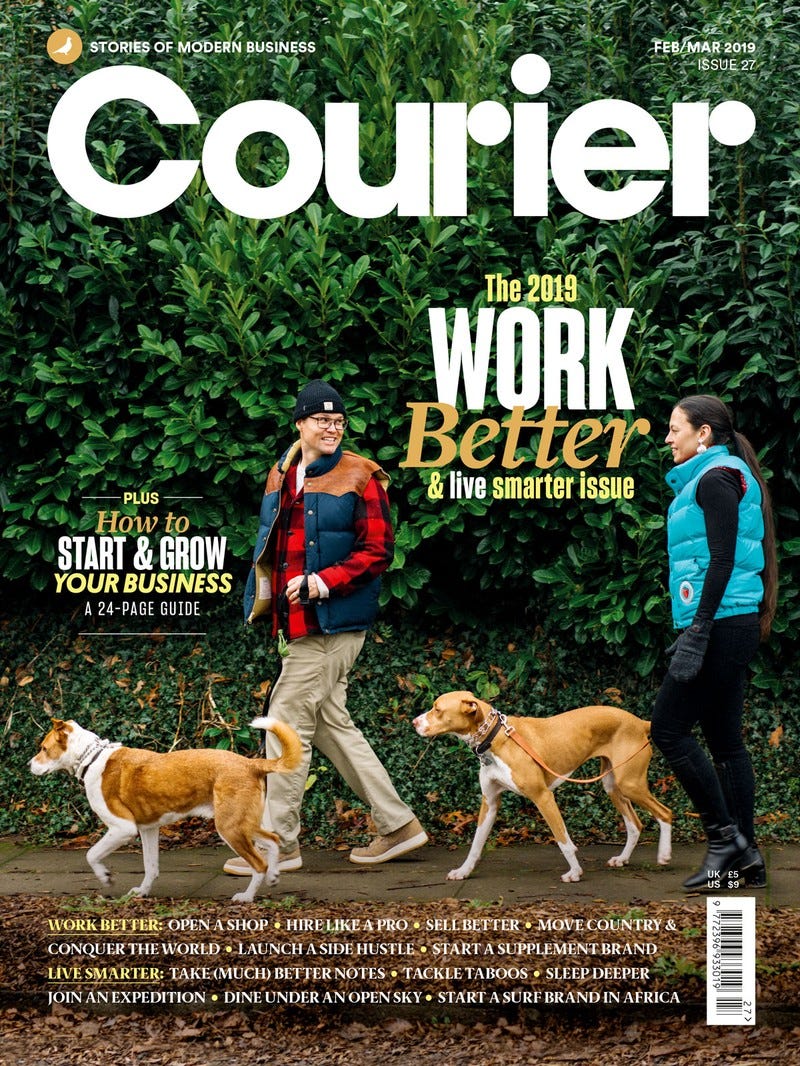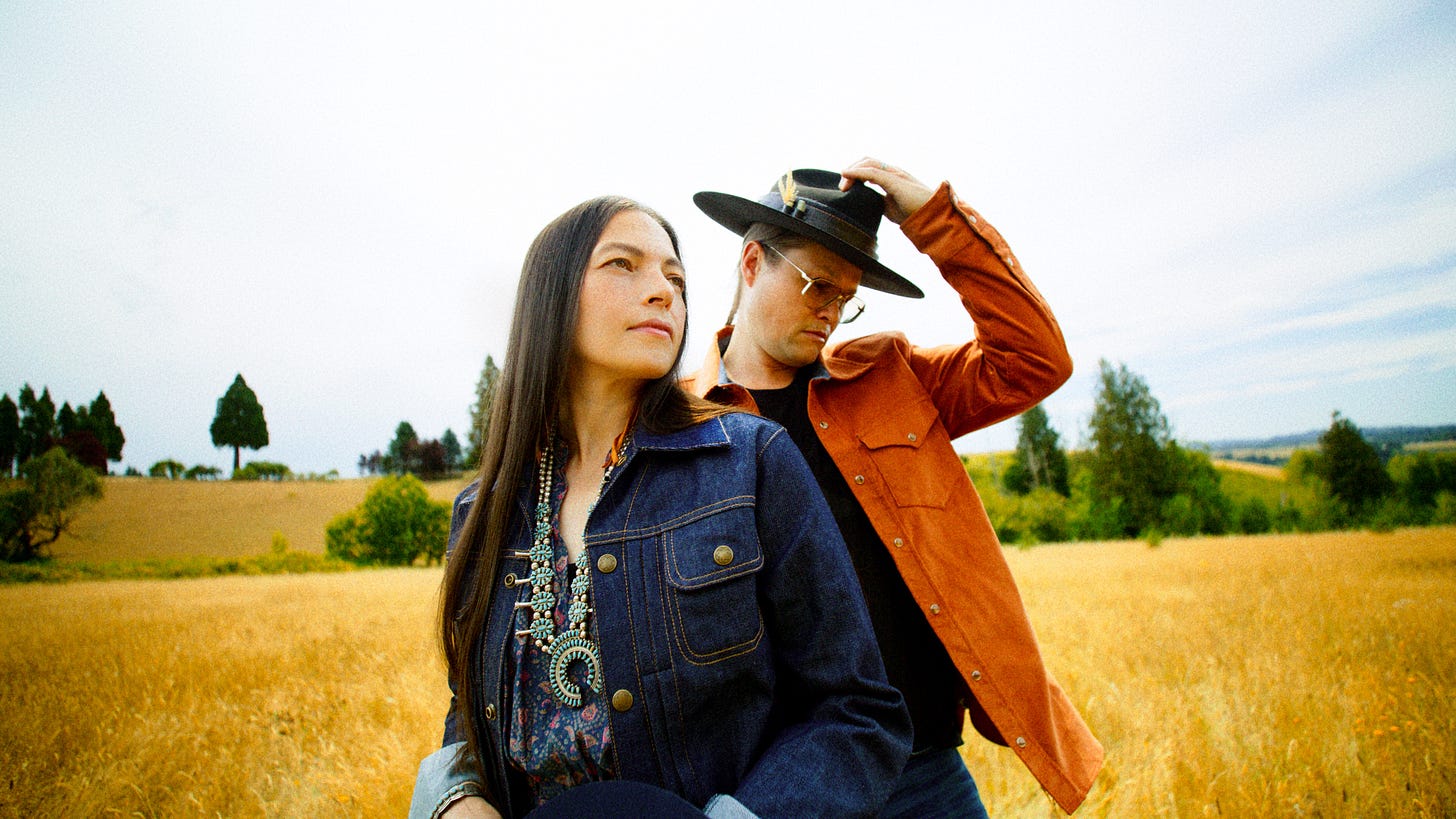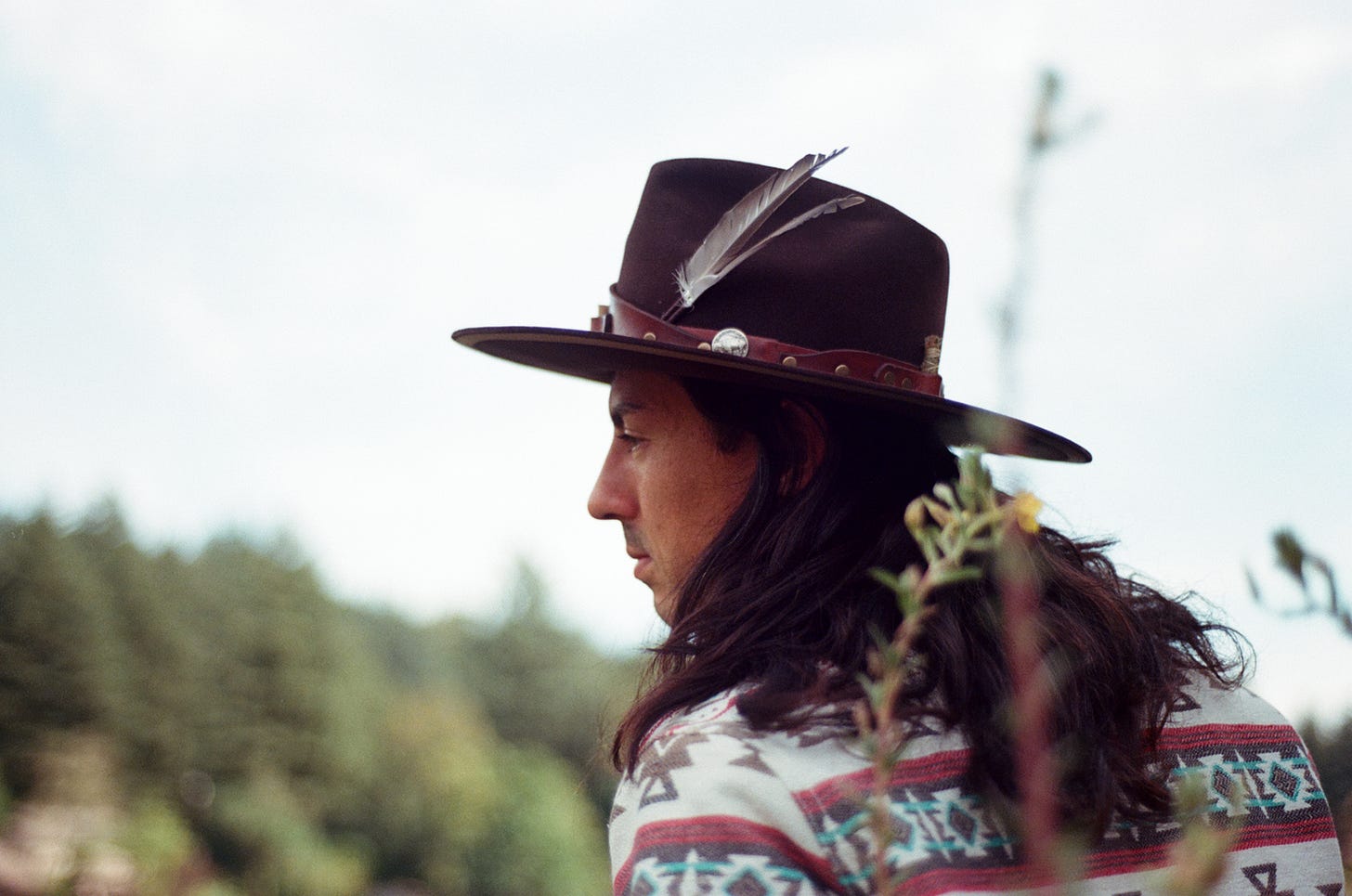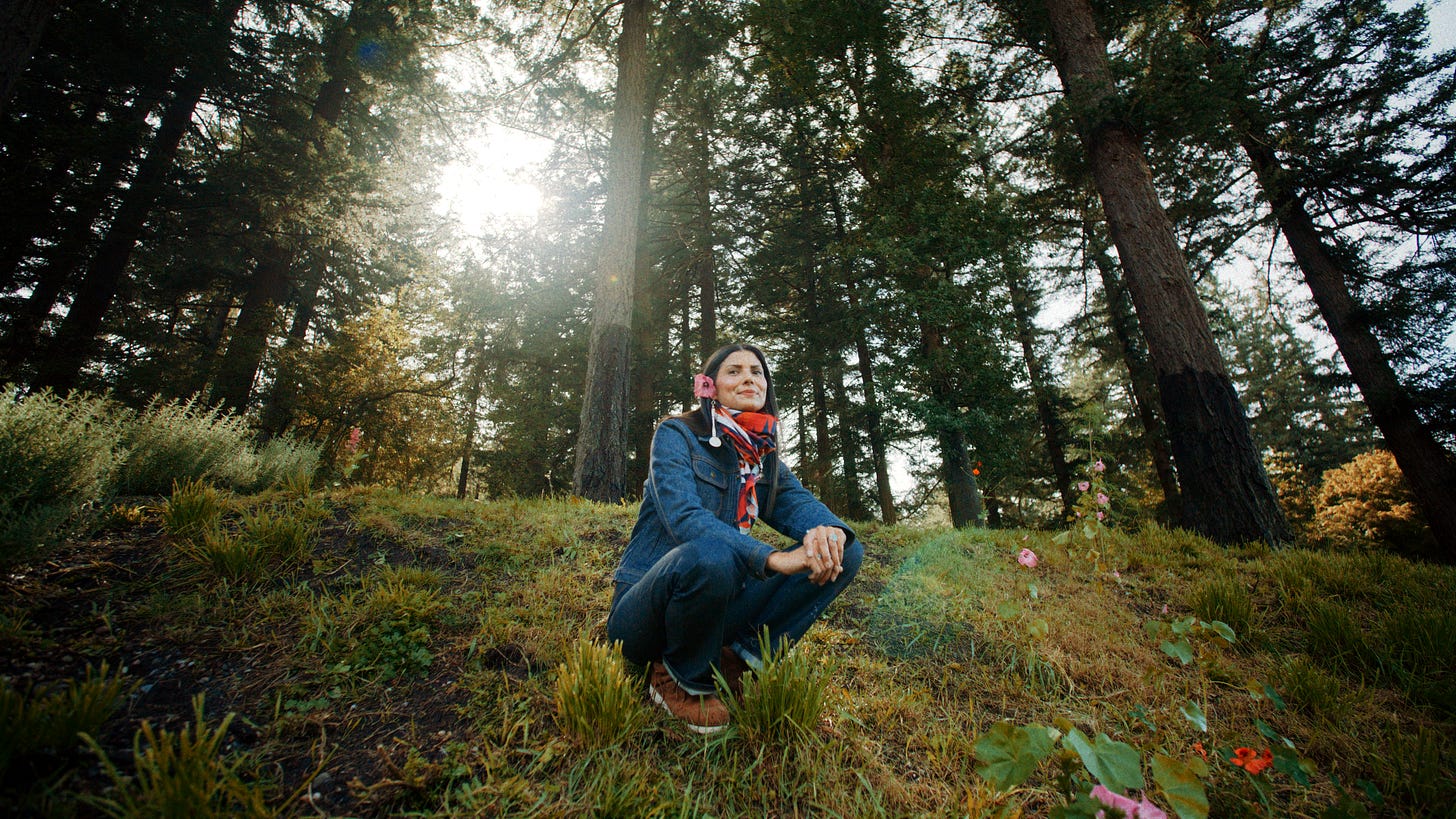Lessons on living a good life
Path #16: Erik Brodt, physician and co-founder of Ginew, the first Native American-owned denim brand
Back in 2018, I stumbled upon a beautiful company called Ginew. Run by Erik Brodt and Amanda Bruegl, a married couple in Oregon who also happened to be literal doctors, Ginew was, and is, as far as anyone can tell, the first Native American-owned denim brand... anywhere.
I loved it. Loved their clothes. Loved their mission. Loved how Erik and Amanda had highly demanding day jobs, yet still found the energy and passion to put something exciting and creative into the universe. I loved it all so much that I interviewed them for Courier. We visited them at their house in Portland and did a full-blown photoshoot. We even put them and their cute dogs* on the cover of the magazine.

A lot has happened since then. A pandemic. The rise of work from home. A queen died. AI ascended. People lost their life savings on monkey JPEGs. And as for Erik and Amanda, they grew their family, moved from Portland to a farm with some goats and sheep, and launched even more projects and businesses.
Below, Erik and I reconnected for a deep talk about…
balancing ambition with family life
figuring out the things that matter most
finding inspiration in your backyard
and a whole lot more
As ever, I’d love if you subscribe, share with a friend, leave a comment, or let me know what you think. Enjoy.
—Danny
Erik, you guys left Portland! Where are you now?
We moved out to the country! To a little town in the National Scenic Area along the Columbia River Gorge. We left Portland for a few reasons, mostly related to kids and safety and school districts. Now we’re literally in the country. We have mountain lions. We saw a big elk on our way to get fuel the other day.
Incredible. The first thing that drew me to you and Amanda is how you manage to run Ginew alongside incredibly demanding careers as doctors – and now also as parents. What’s changed?
Back then, we were still using the first level of our home as Ginew’s shipping area and office. One night, when Amanda was eight and a half months pregnant, we packed up over a hundred bandanas, because bandanas were selling like crazy in 2020. After, she was like, That’s the last time we do that. We had to get the business out of our home. So we rented a small portion of a warehouse space. It was a big shift because we couldn’t just go downstairs and work. We had to be more intentional. Then we had our first child, in a pandemic, and it was just wild. Our focus became more on being parents. Trying to navigate this path of guiding a new human in the world and preparing them for a future that we don’t even know yet.
This was also during Covid, and you were, and are, a doctor…
Yeah, I got repurposed as a Covid provider. People don’t really talk about this stuff as much anymore, but 2020, pre-vaccine, was really rough. We take it for granted that we have these protective measures now, but we didn’t really have them then. We were super isolated. But it reaffirmed in our own lives a focus on what’s most important to us. Family. Each other. Our community.
So many business founders pay lip service to that stuff, but then prioritise other things.
Here’s the thing. I’m in a lot of spheres. I’ve had the opportunity to spend time with billionaires, people who have built big businesses and sold them. And the story is always the same. If they have kids, after they get successful they’ll say, Now I can make up for lost time with my spouse and children. But they’re telling themselves a lie. You can’t make up for lost time. It’s that intense founder energy where the idea, the brand, the business, the financial potential is all that matters, and everything else suffers. I don’t want to live like that. I never want to be that person.
When they’re 85, they’ll be happy they maximised shareholder value! No, but seriously… carpe diem. Don’t delay living your life.
Yes. At this point in our lives, nothing is worth the price of missing dinner and bedtime with my family. There’s an opportunity cost and I’ve made a value decision there, which will no doubt cost me from climbing some corporate ladder. But I’ve let it go, you know what I mean? Did I go to Paris this year for the shows? No. People will say, But this could be huge for your company! And I’m like, Sure, but let it be huge for somebody else. I’m okay with that.
You don’t always have to be on the cover of Forbes.
And many of those people are so unhappy, I’m telling you.
Sure. And that unhappiness is something people should talk more about. I've interviewed thousands of entrepreneurs and I’m always much more interested in their struggles and failures than happy success stories.
Everybody wants to focus on the successes, the geniuses, the lightning in a bottle. But those are weird narratives. Because the road to excellence is paved in failures and iterations. Michael Jordan spent a lot of time in the gym!
Did this perspective take time to develop? Earlier in your career did you want to conquer the world?
I just didn’t have so many people relying on me back then. At my day job, I now lead a team of around 55 people. They need me to be good at that. At Ginew, we’ve got a team of around 10. They also need me to be good at that. I don’t need to conquer the world. It’s funny, I was in my 20s when I realised I was never going to visit every country. I used to want to go everywhere, see and do everything. Then I realised I’d rather go deeper in the places and activities I enjoy. The spaces that impacted me and which I’ve impacted. Amanda and I are now some of the most well-known American Indian and Alaska Native health workforce development people in the world. That’s what we do. And we make a difference there.
And what difference are you trying to make with your brand, Ginew?
I’m pretty sure Ginew is the only American Indian or Alaska Native lifestyle brand in the world for both men and women. We’ve been doing this for 14 years. That’s crazy to say, man. Most brands last three seasons and they’re dead. I think the reason we’ve been able to hold onto this space is because there’s an impact to what we’re doing. It’s important for people to see that American Indian and Alaska Native people exist beyond 1887. That we’ve been a part of every major movement that has ever existed in this country. That’s not a preachy thing, it’s just reality.
Like, Jimi Hendrix was deeply immersed in the Native community that his family were leaders of in the Seattle area. Style icons like Brando, McQueen, James Dean, Janice Joplin, they were hanging out with Native people and their style was highly influenced by that wellspring of culture.
Do you know that popover shirt where the top third is cut or buttoned down? That’s a Native designed shirt and was the most popular top in North America, pre-1492. When European folks came over, they were like, Holy shit, look at that shirt. And then the Native people saw the fabrics the Europeans were using, and they merged it all together. Those sorts of things get lost on people.
On the other side of that spectrum, there’s an obsession or fetishisation of Native American motifs in fashion – in workwear, western wear, some Japanese brands, etc.
For us, it’s important to just be authentic. We don’t go out there and pretend. We’re just contemporary American Indian people. Other people might paint big dramatic stories or whatever. But our stories are: farmer, logger, welder, homemaker, cook. It’s just very different. You see what I mean?
And how has business been for Ginew these past four years?
My god, it’s changed so much.
In what sense?
In 2019, we were mostly a wholesale business. We had stores in Japan and Europe and a sprinkling in the US. The stores were ordering enough stuff that 80% of our business was wholesale and only 20% was direct. That’s completely flipped.
Wow, why?
So many shops are struggling at the moment, which is sad. It’s been a hard thing for us to swallow this year. Seven shops placed big orders with us, then said, We don’t have enough money to pay you. These are great shops, some of the best in the industry. So we’ve since gone more direct-to-consumer. The customer now gets to interact with us more and learn the Ginew story from us, rather than through a middleman.
How do you prioritise what you work on on any given day?
We don’t have it figured out. Every week we’re learning. Some weeks we do it better, and some weeks we’re like, That didn't go too well, let’s change it up. On Friday, I got back from a work trip. I wasn’t feeling great yet I had a bunch of work to do for my day job. But I called in sick and took time for myself. Both my kids were sick too. So I stayed home and took care of two sick kids, hung out with two dogs, and made sure the sheep and goats got in and out. That was our day. It may not sound sexy, but it’s about prioritising things. That’s where balance comes in. Either you can or can’t. If I just pushed through, I would have failed at everything.
The big difference between me five years ago and me right now is I’m not working nights and weekends. I’m not sending emails to my team at 11pm and again at 4am. I’m not squeezing in a quick trip to LA every four weeks. It’s better for everyone and it’s better for the brand. It’s just about working smarter, not harder.
This is a common outcome from the pandemic, too. Lots of people had a revelation that their life was unsustainable. Now they’re experimenting with new ways of living. You guys left Portland, were in the deep shit of Covid as doctors, and learned so much about who you are and what you want to do. These things change you.
As a doctor, you’re trained to help people. To give medicine to fix them. But there were moments I felt so helpless. There’s a lot of competing narratives out there about what Covid was like. I don’t care what any politician or conspiracy theorist says—those of us who were in the hospital system know what it was like. That feeling of, I trained for years but I just watched somebody melt away and die. They were just talking to me 45 minutes ago. I’d never experienced anything like that before.
And here’s the real kicker. Portland has had real problems with fentanyl and drug overdoses. And since 2020, overdoses have accounted for more deaths than Covid. And I’m telling you, man, a lot of people died from Covid here. Yet more people are dying from overdoses on the street. That’s sobering shit.
Life is short. Instead of looking ahead all the time, don’t forget to savour the beauty of the moment you’re having right now, even if it’s not perfect. Because one day you might look back and be like, Wow, that was the best moment in time.
What are some of those moments of beauty that have stood out for you?
I’ve been soaking up the wonder on our children’s faces. The pure bliss and joy and excitement. Every morning and night, when we let the goats and sheep into the pasture, my daughter and son are so excited. It’s like they can’t contain themselves.
Alright, time to talk about these goats and sheep…
Right. So we bought a farm. The goats and sheep had been on the land for nine years. They’re old-ass goats and sheep. They keep the meadow down. We don’t eat them or anything. Their job is to eat down the blackberry bushes and the fields.
Love it. But also… it's yet one more thing you have to look after every day.
Sure, but it’s a pause for intention, right? I’ll tell you what, the past year since we moved out to this farm, we’ve seen more sunrises and sunsets than in maybe the past 10 years. We watch the sunset every single night without fail.
I hear you. The west coast is special. The mountains and coastal drives and otherworldly deserts. I’ve been around the block but never experienced that sort of natural beauty before moving out here.
Before you move back to London, soak up those periwinkle blues. Those west coast sunsets—I’ve never seen anything like that anywhere in the world.
What inspires you right now in terms of things you’re doing, stuff you’re working on, places you’re traveling to?
Our existence used to be about going places. We were based in Portland and we’d go to Baja, the Caribbean, Japan, Finland, Vancouver, London. And that has completely shifted. Now we’re like, How do we bring that inspiration back here? So Amanda and I are actually building an experience center at our house that corporations and people can rent. We’re also going to be doing indigenous-themed agritourism in the Columbia River Gorge. We want to share our farm, food ideas, connections. And we started a speaking consultancy called Daybreak.
That’s fantastic. What else are you spending your brain time on? Any rabbit holes you’ve gone down?
I’m been thinking a lot about the connection between the inside and outside. By that, I mean, how can you have a continuum of what you’re feeling in your heart, with what’s coming out of your mouth? Those things should be in alignment and in sync. Does that resonate with you?
Yes, 100%.
There’s even architecture that complements this idea. Have you seen those homes where the connection between inside and outside is as seamless as possible? It’s not an abrupt, jarring thing. A room connects to the outside deck, and it’s a smooth transition. I want that smooth continuum of inside and outside in my life, too.
Erik, it’s always a pleasure talking with you.
You too, Danny. This conversation reminded me of a story. I’ve got two rugged biker dudes who are friends of mine. They built choppers during the pandemic and dreamed up a 6,000 mile road trip. On their way back, they stopped and stayed at our house. I saw that one of them had a sticker on the tank of his motorcycle. At first, I thought it was going to be one of those ultra-self-reliant Don’t tread on me things.
Instead, it said:
If you value your life as much as I value this motorcycle, that’s beautiful, man. Namaste.
*In memory of their beloved dog, Stinky Francis Bruegl Brodt ❤️
—
GO DEEPER… Shop Ginew // Instagram // Erik
—
Until next time,











I really enjoyed this Daniel, thank you
Loved this, Danny. An unexpectedly moving interview. I may have shed a tear or two. Inspiring stuff! I've been thinking about what success is a lot lately and this has really resonated. A case study of a very healthy dynamic and sustainable approach to success while having a family and actually being there for them.